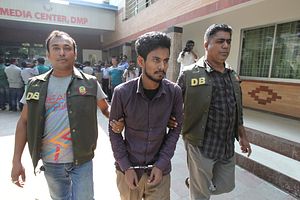For three years, secular bloggers, gay rights activists, religious minorities and educators have been murdered by men with machetes in Bangladesh. Until recently these sporadic but highly publicized killings have left the international media guessing who was responsible. The Islamic State (ISIS) has sometimes claimed credit, but recent developments disprove any major link to the international terrorist group. Instead, what we have in Bangladesh, sadly, is the sinister targeting of innocents – probably for political purposes – by home-grown militants.
The simple truth is that ISIS doesn’t have the operational capacity to carry out attacks in Bangladesh. Immigrants simply don’t come to Bangladesh from Iraq and Syria. As a consequence, outsiders have confused the actions of local terrorists with ISIS activities, a misdirection that the extremists are happy to promote.
To crack down on these attackers, Bangladesh police recently detained a couple thousand suspected extremists and charged some 200 of them with wrongdoing. International news mistakenly portrayed the crackdown as a single roundup of more than 11,000 people, and criticized it as indiscriminate. This is incorrect. Instead, the crackdown took place over seven days, was carried out by 650 police departments around the country, and averaged about 1,600 arrests per day – about the same as an ordinary day in Bangladesh. The majority of those arrested – about 8,000 – were criminals with outstanding warrants. Nonetheless, the effort was a major step toward preventing further local extremism.
Bangladesh’s outlaw extremist organizations are not well-known outside the country. But ISIS is. In the perverse world of death and torture, claiming to be part of ISIS is a badge of honor. In Bangladesh, it’s also a ruse.
This became clear recently with the breakthrough arrest of Saiful Islam, a 23-year-old teacher at a local madrasa, or Islamic school. Police questioning of Mr. Islam confirmed that recent machete killings have been organized by two very local and very militant Islamic groups, the Ansar al-Islam and Jama’atul Mujahedeen. Mr. Islam explained to police that the attacks were a direct response to the so-called Shahbag movement that took shape in Bangladesh in early 2013. The Shabag movement advocated an end to religion-based politics and the prosecution of war crimes that date back to 1971 War of Liberation. Both of these positions were anathema to the likes of Ansar al-Islam.
The extremists’ response was quick and vicious. The first attack, on February 15, 2013, was against a blogger who wrote critically about Islam. It was carried out by students from North South University in Dhaka, Bangladesh’s capital. The attackers were spurred to violence by the spiritual leader of Ansar al-Islam, Jasim Uddin Rahmani. More attacks followed.
Unfortunately, Ansar al-Islam is not the only group committing horrible acts. Ansar al-Islam’s slightly less organized counterpart, Jama’atul Mujahedeen Bangladesh, has also sought to silence voices for peace and democracy with barbarous attacks. The group works almost exclusively in northern Bangladesh and, authorities now say, is responsible for the murders of a homeopathic doctor, an English professor at Rajshahi University and a 66-year-old Japanese man, among others.
According to Mr. Islam, the group used madrasa students, whose ideas and beliefs had been warped by radical teachers, to commit these murders. Simply put, the group was indoctrinating local youth in Islamic schools and molding them into extremists. This is a tragedy, but it isn’t ISIS’s doing.
Another instigator is Jamaat-e-Islam, a political organization that opposes the current government. Abu Nasur, a worker in Islami Chhatra Shibir, the student wing of Jamaat-e-Islami, was arrested and charged with the murder of Mahmuda Kahnom. Kahnom was the wife of Babul Akter, a senior Bangladeshi police officer responsible for operations against religiously motivated armed groups. She was killed while she walked her young son to his school bus.
To be sure, ISIS has claimed responsibility for several of these attacks. But those claims are nothing more than public relations moves by the terrorist group. To augment this deceptive self-promotion, ISIS has begun to devote a section of its journal, Dabiq, to Bangladesh. Its aim is to bolster the narrative of ISIS’s expansion even though it is untrue. Militant groups in Bangladesh accept this affiliation because they believe that it boosts their image as well.
Bangladesh is an ideologically diverse country. Its complex web of Islamist groups ranges from moderate to radical. After the national election in 2009 when the secular Awami League government rose to power, Jamaat-e-Islami and its allies began resorting to violence. Their desperation led to occasional claims of cooperation with ISIS. This was partly to conceal their nefarious activities and also to make their actions seem more menacing than they really were.
Supposed links to ISIS offer local groups an opportunity to rebrand and modernize their radicalism. But in fact, Iraqis and Syrians are not committing these crimes. The culprits are Bangladeshi extremists who have been indoctrinated from a young age locally to lash out against a secular government like the one Bangladesh now proudly has.
Sajeeb Wazed is the chief information technology adviser to the government of Bangladesh and the son of Prime Minister Sheikh Hasina.

































